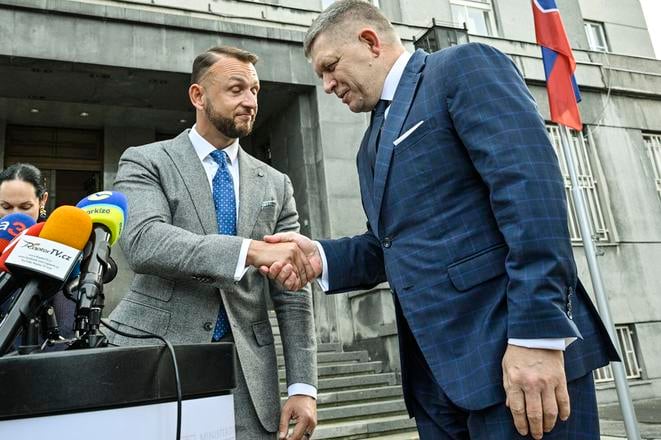A politically sensitive criminal case in Slovakia has raised concerns about political interference after Prime Minister and Smer chair Robert Fico was granted unusual access to confidential investigation files.
The case centres on former National Crime Agency (NAKA) East director Matej Varga, who is charged with sabotage. Prosecutors allege that in 2022 he ordered surveillance of Prosecutor General Maroš Žilinka and his deputy Jozef Kandera, fearing they might intervene in an investigation targeting Fico and his ally Robert Kaliňák in the Súmrak (Twilight) case. That earlier case involved allegations of a criminal network connected to Smer, Fico’s party.
Although Fico was only indirectly linked to Varga’s charges, he successfully requested recognition as an “injured party” – a legal status that grants extensive rights in criminal proceedings. Within two days of Varga being charged, the prime minister was given access to the case file. His lawyer and government adviser, David Lindtner – himself facing trial for indirect corruption and undue influence over courts – even obtained a copy.
It remains unclear what harm Varga’s actions could have caused Fico personally to justify such a status.
By contrast, Varga himself had to wait several weeks, submitting eight requests before finally being allowed only partial access to the file. He was denied permission to make copies.
Critics say the double standard suggests political interference. Varga’s lawyer, Peter Kubina, asked whether the Interior Ministry’s police inspectorate was “acting under political orders”, warning that legal processes become political the moment politicians begin influencing the evaluation of evidence. Kubina has formally requested a review of the investigator’s conduct, noting that Fico was granted privileged access without even being questioned in person – the decision was based solely on a phone call.
The inspectorate, which investigates misconduct by police officers, has not explained why Fico’s request was fast-tracked. The body is led by Branislav Zurian, a nominee of the junior ruling Hlas party. Meanwhile, a regional prosecutor has already questioned whether there is sufficient legal basis for the charges against Varga. Nevertheless, Interior Minister and Hlas leader Matúš Šutaj Eštok promptly suspended him from service.
Varga was detained on 1 July and released only late on 3 July, following the intervention of a prosecutor from the Košice Regional Prosecutor’s Office. His case has since stalled. The prosecutor originally assigned to the case went on sick leave shortly after it was allocated to him.
For more than a month, Varga has been suspended on minimum pay and confined to his home – a situation resembling that of several other police officers linked to Ján Čurilla, who are viewed negatively by Fico’s government for investigating corruption and organised crime cases tied to Smer. By contrast with Varga, their suspension has already lasted around two years.
Following the dissolution of NAKA, Varga was not permitted to transfer to its successor, the Office for Combating Organised Crime. Instead, he was reassigned as a district police investigator in Prešov.


